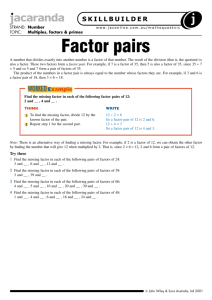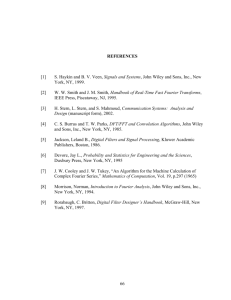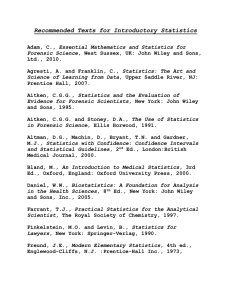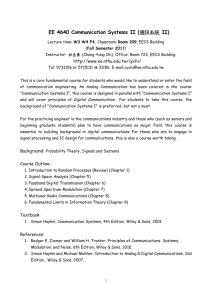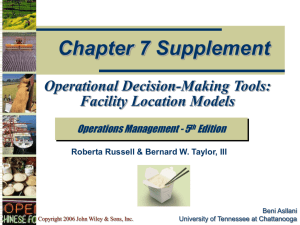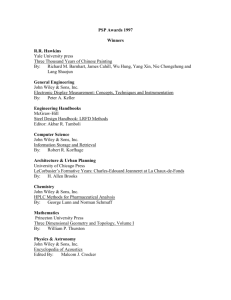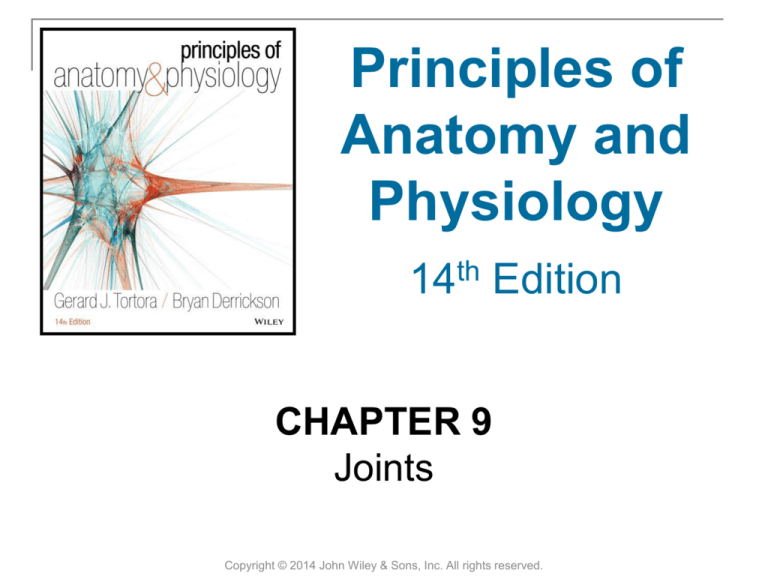
Principles of
Anatomy and
Physiology
14th Edition
CHAPTER 9
Joints
Copyright © 2014 John Wiley & Sons, Inc. All rights reserved.
Introduction
The purpose of the chapter is to:
1. Introduce the various types of joints in the body
2. Discuss how those joints are classified
3. Learn the types of movements that can be
carried out at a joint
Copyright © 2014 John Wiley & Sons, Inc. All rights reserved.
What is a joint?
A joint is a point of contact between:
Two or more bones
Cartilage and bone
Teeth and bone
Copyright © 2014 John Wiley & Sons, Inc. All rights reserved.
Classification of Joints
Joints can be classified
Structurally
Is there a joint cavity?
What type of connective tissue is involved?
Functionally
What degree of movement is permitted?
Copyright © 2014 John Wiley & Sons, Inc. All rights reserved.
Classification of Joints
Anatomy Overview:
Joints
You must be connected to the Internet and in Slideshow Mode to
run this animation.
Copyright © 2014 John Wiley & Sons, Inc. All rights reserved.
Structural Classification of Joints
Fibrous
•
Sutures – dense
fibrous CT
Ex. Suture
• Syndesmoses –
more dense
fibrous CT than a
suture
Ex. Gomphosis
• Interosseous
membranes – a
broad sheet of
dense fibrous CT
Ex. Between radius
and ulna
Cartilaginous
Synovial
•
Articular cartilage
on ends of long
bones and a
synovial cavity
between articulating
bones surrounded
by accessory
ligaments; freely
moveable
Ex. Hip, knee,
shoulder, elbow
Synchondrosis –
•
hyaline cartilage; no
movement
Ex. Epiphyseal plate
• Symphysis –
fibrocartilage; some
movement
Ex. Pubic symphysis
Copyright © 2014 John Wiley & Sons, Inc. All rights reserved.
Functional Classification of Joints
Synarthroses
Amphiarthroses
Diarthroses
•
•
•
Allow no
movement
Ex. Suture,
gomphosis
Allow little
movement
Ex. Pubic symphysis,
intervertebral discs
Freely moveable
Ex. Hip, knee,
shoulder, elbow
Copyright © 2014 John Wiley & Sons, Inc. All rights reserved.
Fibrous Joints
Lack a synovial cavity
Articulating bones are held together with
dense fibrous connective tissue
Permit little or no movement
Types:
Sutures
Syndesmoses
Interosseous membranes
Copyright © 2014 John Wiley & Sons, Inc. All rights reserved.
Examples of Fibrous Joints
Copyright © 2014 John Wiley & Sons, Inc. All rights reserved.
Examples of Fibrous Joints
Copyright © 2014 John Wiley & Sons, Inc. All rights reserved.
Cartilaginous Joints
Lack a synovial cavity
Articulating bones are held together with
cartilage connective tissue
Permit little or no movement
Types:
Synchondroses
Symphyses
Copyright © 2014 John Wiley & Sons, Inc. All rights reserved.
Examples of Cartilaginous Joints
Copyright © 2014 John Wiley & Sons, Inc. All rights reserved.
Synovial Joints
Have a synovial cavity
Articulating bones are covered with articular
cartilage, held together by ligaments,
contain synovial fluid, have a nerve and
blood supply, and are surrounded by an
articular capsule
Permit a large range of movement
Copyright © 2014 John Wiley & Sons, Inc. All rights reserved.
Structure of a Synovial Joint
Copyright © 2014 John Wiley & Sons, Inc. All rights reserved.
Bursae and Tendon Sheaths
Bursae and tendon sheaths can be found at
many synovial joints
Bursae – sac-like structures filled with synovial
fluid that cushion movement of one body part over
another
Tendon sheaths – tube-like bursae that wrap
around tendons subject to a great deal of friction
Copyright © 2014 John Wiley & Sons, Inc. All rights reserved.
Types of Movement at Synovial Joints
Copyright © 2014 John Wiley & Sons, Inc. All rights reserved.
Types of Movement at Synovial Joints
Copyright © 2014 John Wiley & Sons, Inc. All rights reserved.
Types of Movement at Synovial Joints
Copyright © 2014 John Wiley & Sons, Inc. All rights reserved.
Types of Movement at Synovial Joints
Copyright © 2014 John Wiley & Sons, Inc. All rights reserved.
Types of Movement at Synovial Joints
Copyright © 2014 John Wiley & Sons, Inc. All rights reserved.
Types of Movement at Synovial Joints
Copyright © 2014 John Wiley & Sons, Inc. All rights reserved.
Types of Movement at Synovial Joints
Copyright © 2014 John Wiley & Sons, Inc. All rights reserved.
Types of Synovial Joints
Copyright © 2014 John Wiley & Sons, Inc. All rights reserved.
Types of Movement at Synovial Joints
Copyright © 2014 John Wiley & Sons, Inc. All rights reserved.
Types of Movement at Synovial Joints
Copyright © 2014 John Wiley & Sons, Inc. All rights reserved.
Factors Affecting Contact and Range
of Motion at Synovial Joints
Structure and shape of the articulating
bones
Strength and tautness of the joint ligaments
Arrangement and tension of the muscles
Contact of soft parts
Hormones
Disuse
Copyright © 2014 John Wiley & Sons, Inc. All rights reserved.
Selected Joints of the Body
Copyright © 2014 John Wiley & Sons, Inc. All rights reserved.
Temporomandibular Joint
Copyright © 2014 John Wiley & Sons, Inc. All rights reserved.
Temporomandibular Joint
Copyright © 2014 John Wiley & Sons, Inc. All rights reserved.
Temporomandibular Joint
Copyright © 2014 John Wiley & Sons, Inc. All rights reserved.
Shoulder Joint
Copyright © 2014 John Wiley & Sons, Inc. All rights reserved.
Shoulder Joint
Copyright © 2014 John Wiley & Sons, Inc. All rights reserved.
Shoulder Joint
Copyright © 2014 John Wiley & Sons, Inc. All rights reserved.
Shoulder Joint
Copyright © 2014 John Wiley & Sons, Inc. All rights reserved.
Elbow Joint
Copyright © 2014 John Wiley & Sons, Inc. All rights reserved.
Hip Joint
Copyright © 2014 John Wiley & Sons, Inc. All rights reserved.
Hip Joint
Copyright © 2014 John Wiley & Sons, Inc. All rights reserved.
Hip Joint
Copyright © 2014 John Wiley & Sons, Inc. All rights reserved.
Knee Joint
Copyright © 2014 John Wiley & Sons, Inc. All rights reserved.
Knee Joint
Copyright © 2014 John Wiley & Sons, Inc. All rights reserved.
Knee Joint
Copyright © 2014 John Wiley & Sons, Inc. All rights reserved.
Knee Joint
Copyright © 2014 John Wiley & Sons, Inc. All rights reserved.
Aging and Joints
As we age, our joints experience:
Decreased production of synovial fluid
Thinning of articular cartilage
Loss of ligament length and flexibility
Arthroplasty
Joint replacement surgery can be performed to
counter some of the effects of aging
Copyright © 2014 John Wiley & Sons, Inc. All rights reserved.
Arthroplasty
Copyright © 2014 John Wiley & Sons, Inc. All rights reserved.
Arthroplasty
Copyright © 2014 John Wiley & Sons, Inc. All rights reserved.
End of Chapter 9
Copyright 2014 John Wiley & Sons, Inc.
All rights reserved. Reproduction or translation of this
work beyond that permitted in section 117 of the 1976
United States Copyright Act without express
permission of the copyright owner is unlawful. Request
for further information should be addressed to the
Permission Department, John Wiley & Sons, Inc. The
purchaser may make back-up copies for his/her own
use only and not for distribution or resale. The
Publisher assumes no responsibility for errors,
omissions, or damages caused by the use of these
programs or from the use of the information herein.
Copyright © 2014 John Wiley & Sons, Inc. All rights reserved.

